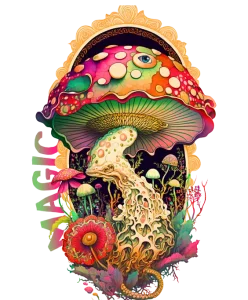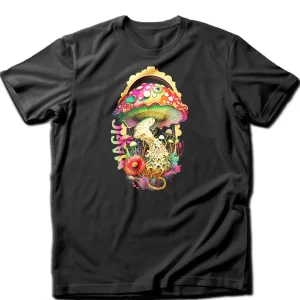The use of magic mushrooms, which contain the psychoactive compound psilocybin, has been a subject of interest and debate for decades. While many individuals have reported positive and transformative experiences with psilocybin, there are also concerns about its potential impact on mental health. In this article, we will explore the relationship between magic mushrooms, psilocybin, and depression to shed light on the complexities of this topic.
I. Understanding Magic Mushrooms and Psilocybin A. What Are Magic Mushrooms?
Magic mushrooms, also known as shrooms, are a type of fungi that contain varying concentrations of psilocybin and psilocin, the compounds responsible for their psychoactive effects. These mushrooms come in different species and are often consumed for their mind-altering properties.
B. The Psilocybin Experience
When ingested, psilocybin is metabolized into psilocin, which interacts with serotonin receptors in the brain, leading to alterations in perception, mood, and consciousness. Users may experience vivid visual and auditory hallucinations, changes in time perception, and intense emotional experiences during a psilocybin trip.
II. The Connection Between Psilocybin and Mental Health A. The Therapeutic Potential of Psilocybin
In recent years, there has been a resurgence of interest in the therapeutic potential of psilocybin for mental health conditions. Studies have explored its use in treating depression, anxiety, post-traumatic stress disorder (PTSD), and other psychiatric disorders. Some research suggests that psilocybin-assisted therapy may offer a novel approach to addressing these conditions.
B. Positive Effects on Mood and Well-Being
Many individuals who have undergone psilocybin-assisted therapy or used magic mushrooms in a controlled and supportive setting report positive effects on mood and well-being. They describe experiences of profound insights, increased feelings of interconnectedness, and enhanced emotional processing. Some even attribute these experiences to long-lasting improvements in their mental health.
III. The Dark Side: Potential Risks and Challenges A. The Psychedelic Experience and Vulnerability
While some people find the psilocybin experience to be transformative and positive, others may encounter challenging or even adverse effects. The psychedelic experience can be intense and emotionally charged, potentially leading to feelings of anxiety, confusion, or vulnerability.
B. The Risk of Triggering Mental Health Issues
For individuals with a history of mental health conditions, including depression, there is a concern that the use of psilocybin or magic mushrooms could trigger or exacerbate symptoms. Those with a predisposition to psychosis or certain psychiatric disorders should exercise caution when considering psychedelic substances.
IV. The Role of Set and Setting A. The Importance of Set and Setting
The impact of psilocybin on mental health outcomes is closely linked to the concept of “set and setting.” “Set” refers to the individual’s mindset, expectations, and emotional state, while “setting” pertains to the physical and social environment in which the psychedelic experience occurs. A supportive and controlled setting, along with a positive mindset, can influence the nature of the experience.
B. Integration and Support
Integration and post-experience support are crucial components of responsible psilocybin use. Integration involves reflecting on and processing the insights gained during the psychedelic experience with the help of a trained professional or a support network. This process can contribute to more meaningful and lasting changes in mental well-being.
V. Conclusion The relationship between magic mushrooms, psilocybin, and mental health is complex and multifaceted. While some individuals report positive and transformative experiences with psilocybin, there are also potential risks, especially for those with a history of mental health conditions. Responsible use, in a supportive setting and with proper guidance, may offer therapeutic benefits, but caution is essential.
As research on psilocybin continues to advance, it is crucial to approach its use with respect, mindfulness, and a comprehensive understanding of individual differences and vulnerabilities. Ultimately, the impact of psilocybin on mental health is a topic that warrants further exploration and ongoing scientific investigation.



